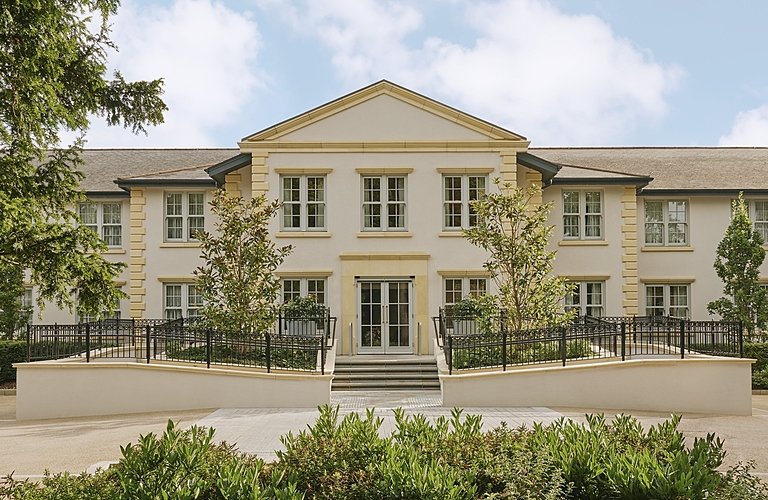192 Sloane Street, London SW1X 9QX

What Is A Respite Care Home?
A respite care home, also known as a respite care facility, is a care home that provides short-term care for older people or individuals living with dementia. Respite care offers family caregivers and loved ones a valuable break from caregiving responsibilities.
Staying in a respite care home allows the primary caregiver time to rest and recharge. Respite care homes provide round-the-clock care in a safe environment. They offer the same services you would find in a traditional care home, including assistance with personal care, medication management, meals, laundry, housekeeping and activities.
However, the care is temporary rather than permanent. We at KYN explore everything you need to know about respite care homes. Read on to learn what respite care involves, what it offers caregivers, how to arrange respite stays and more.
What Is Respite Care?
Respite care gives family caregivers a break from caring for loved ones with high care and support needs. It provides short-term care in a safe environment for the person they usually look after at home.
Many care homes offer respite care services for older people and individuals living with dementia, allowing primary caregivers to rest when they need a break. For example, they may use their respite break to:
- Catch up on sleep
- Spend time with friends
- Engage in hobbies and self-care
- Attend medical appointments
- Go on vacation
Respite care services are ideal for family members who cannot leave someone unattended. They provide round-the-clock care while offering caregivers peace of mind.
Why Consider Respite Care?
Caring for someone full-time often places great strain on family members. Without regular breaks, caregivers risk fatigue, stress and burnout. Respite care is important for renewing energy levels and offers family carers time to focus on their own health and wellbeing.
Respite care also gives care recipients a change of environment. Staying in a care home provides opportunities to socialise, try new activities and benefit from professional care.
What Types of Respite Care Are There?
There are a few different types of respite care available:
Residential Respite Care
This involves staying in a care home for a short period, such as a few days or weeks. Residential respite care provides 24-hour assistance with all daily living activities.
Care homes offer single or shared rooms, along with amenities like dining areas and lounge spaces. This type of respite gives family caregivers an extended break.
Day Care
Day respite care provides structured care and activities during weekdays. Older people can spend the day at the care home, allowing family carers breaks on weekdays. The individual then returns home each evening and weekends.
Emergency Respite Care
Some care homes offer emergency respite care for caregivers needing immediate short-term assistance. This provides same-day admission when families experience a crisis. Emergency respite care gives carers temporary relief during difficult situations.
In-Home Respite Care
Some respite services offer in-home respite care. This involves trained caregivers visiting the family home to provide assistance. It allows the usual caregiver to take a break without relocating their loved one.
Convalescence Respite Care
Convalescence respite care is designed for individuals who need temporary support during recovery from illness or surgery. It's an excellent option for those who don't require long-term care but need assistance as they regain their strength and independence.
How Long Can Respite Care Last?
The duration of respite care varies depending on the family’s care needs. Respite stays can last anywhere from one day up to several months. Care homes typically have maximum stay lengths to ensure availability for other families. However, there is often flexibility; many homes allow extensions if needed and availability permits. The length of stay depends on:
- The care home’s policy
- Availability of rooms
- The level of care required
- The caregiver's needs
Some important things to note:
- Respite care is short-term; it generally ranges from days up to 12 weeks
- Longer stays may be considered permanent placements
- Extensions are possible depending on room availability
Speak to the care home to learn about maximum stay policies. Be open about the duration you need when arranging respite.
What Does A Respite Care Home Provide?
Respite care homes provide comprehensive, personalised care in safe, supervised environments. They offer 24-hour support with:
Personal Care
- Assistance with bathing, dressing and grooming
- Help using the toilet
- Support with mobility and transfers
- Continence management
- Feeding assistance if needed
Health & Wellness
- Managing medications
- Care planning and reviews
- Coordinating medical appointments
- Therapies like physiotherapy
Enriching Activities
- Physical exercise classes
- Brain-stimulating activities
- Arts, crafts and music
- Outings
Hotel-Style Services
- Beautifully furnished bedrooms
- Nutritious chef-prepared meals
- Housekeeping and laundry
Dementia Care
Specialist dementia care homes provide person-centred enrichment to stimulate memory, communication and cognition. This maintains quality of life for individuals living with dementia. Respite care homes offer comprehensive, tailored support so primary caregivers can take a complete break.
How Do I Arrange Respite Care?
If you think respite care could help your situation, follow these steps:
1. Search For Homes Offering Respite Care
Use online directories to find care homes offering respite services. Look for ones meeting your loved one’s needs – for example, dementia care or nursing care.
2. Contact The Homes
Enquire about respite room availability. Confirm they have suitable facilities and expertise to care for your loved one. Ask questions about their care approach.
3. Arrange A Visit
Tour the shortlisted care homes to get a feel for their environment and staff. Observe how they interact with residents. Enquire about activities and enrichment programmes.
4. Choose The Home
Consider factors like location, fees, room types and care specialities. Prioritise homes making your loved one comfortable during visits.
5. Complete Paperwork
Complete the required paperwork, which may include:
- Needs assessments
- Medical history forms
- Local authority funding applications
- Admission forms
6. Schedule Respite Stay
Confirm preferred dates and duration with the home. Ask what to bring on your loved one’s arrival.
How Much Does Respite Care Cost?
The cost of respite care depends on the care home, room type, services required and duration of stay. Fees often range from £800 to £1,500 per week. However, costs can exceed £2,000 weekly for luxury care with extensive services. Many local authorities provide means-tested funding if the care recipient meets eligibility criteria.
To qualify, individuals usually require assistance with multiple daily living activities. If self-funding respite care, long-term payment plans may be available. Some homes offer discounted rates for longer stays exceeding four weeks. Speak to homes directly to learn more about payment options. Confirm costs during initial enquiries.
The Benefits of Respite Care Homes
Respite care offers many benefits for caregivers and care recipients: For caregivers:
- Allows them to recharge and reduce burnout risk
- Offers a complete break from caregiving responsibilities
- Provides time to focus on their own needs
- Peace of mind knowing their loved one has 24-hour care
For care recipients:
- Social opportunities to meet new people
- Tailored activities to enrich wellbeing
- 24-hour assistance from professionals
- Benefits from a change of environment
By providing regular breaks, respite care enables family caregivers to continue caring for loved ones at home. It offers a mutually beneficial solution for both parties.
Luxury Respite Care with KYN
KYN provides luxury respite and residential care across London and the South East. Our beautiful homes offer a warm, welcoming environment for short stays and permanent residency.
Our care team provides round-the-clock support with personal care, medications, specialist dementia care and enriching activities, while our chef prepares nutritious, restaurant-quality cuisine daily. To arrange a respite stay in a luxury KYN home, contact us today. Or call us on +44 (0) 20 3535 1923 or email enquiries@kyn.co.uk.
Related

Join our next Open Day
Please provide your contact details below.
If you are interested in working at KYN, please kindly visit the Careers page. The Open Days listed above are for potential residents and their friends and families, not for recruitment.
Thank you
Thank you for your interest in KYN. We will be in touch with you very shortly.
If you require any assistance in the meantime, please email enquiries@kyn.co.uk or call +44 (0) 20 3535 1923.

